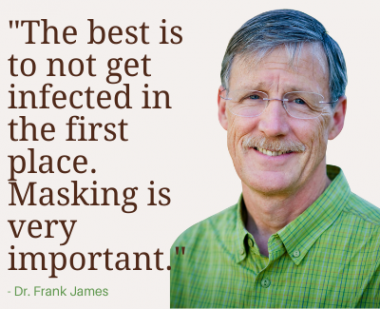Health Expert Weighs In on Ongoing COVID-19 Threats

As my COVID-19 recovery continues, I have questions. So I called public health expert Frank James, MD, to help.
James is active in teaching, research, and medical practice. He is the health officer for San Juan County and the Nooksack Indian Nation in Washington state. He is a clinical assistant professor at the University of Washington School of Public Health and an adjunct professor of global health at the National Yang-Ming University School of Medicine in Taipei, Taiwan.
Excerpts of our conversation follow.
JL: I was vaccinated and boosted but still got COVID-19. What happened? I feel like my vaccines let me down.
FJ: We must remember the vaccine’s goal is to prevent severe disease and death. The vaccine is not going to prevent initial infection, but it will keep it from getting worse. The vaccine prevents the replication of the virus in your body. If you are not in hospital and did not die, that is a success. The vaccines help prevent the severe infections and death that overwhelmed the hospital systems early on.
My COVID-19 rapid test is still positive after 12 days. Am I still contagious? The U.S. Centers for Disease Control’s five-day rule for quarantining doesn’t make sense to me.
The five-day rule was a business decision to get workers back to work. If workers are forced to stay out of the workforce for 10 days, this has a considerable economic impact. In my jurisdiction, infected people test on day six with rapid tests, and if negative go back to work. If the test is positive on day six, they stay out until day 10.
It also depends on the test. The PCR test is much more sensitive, and after an infection, you will test positive for three weeks to 90 days. The rapid antigen [home test] correlates to infectiousness, so, yes, you can still be infectious if your rapid test is positive, but expect your PCR to stay positive. Masking will help prevent spreading [the virus].

(Courtesy of Dr. Frank James, graphic by Jennifer Lynne)
Where do you think we are headed?
This isn’t going away. Our selfishness is our weakness. Eighty percent of Africa hasn’t received a single dose [of COVID-19 vaccines].
My biggest fear is continued innovation by the virus. We have to remember our vaccines were developed against earlier variants. As new variants come around, vaccines are less and less effective. As new variants develop and improve contagiousness, the virus gets around the antibodies we’ve already developed.
The new BA.4 and BA.5 versions of omicron are a good example of this. They are an example of immune escape; the vaccine will not work as well, monoclonal treatments are not working as well, and even prior infection offers significantly less protection. They work around our defenses. The new variants will replace the old variants in a matter of weeks.
Right now, the public doesn’t give a stink, because for the most part, infections aren’t deadly because omicron affects the upper airway and not your lungs. But the other half of this is even a mild COVID-19 infection affects any tissue that has an ACE receptor. This includes your pancreas. We are seeing a 38% increase in diabetes in the general population. The increase is very impactful for those that lose the critical function of their pancreas.
Mortality then goes up from diabetes or problems with your kidneys, brain, heart, pulmonary fibrosis, or vascular system. Autopsies are showing that all tissues with ACE receptors are infected and can be impacted by the infection, not just the lungs and upper airways.
A recently published study found that anyone infected with COVID-19 is at higher risk for heart issues — clots, inflammation, and arrhythmias — long after the illness has passed. A lot of the manifestations we’re describing are chronic conditions that will affect people for a lifetime and will require care for a long time. People, health systems, and governments need to be prepared for that.
Remember a virus survives by replicating and evolving. It’s a bad idea to kill your host. We are just starting to figure out COVID-19’s role in long-term diseases. We really have no idea. Long-term COVID-19 studies are needed to understand morbidity. The next question is can we do anything about it.
Are masks still necessary?
Yes. It is still very important not to get infected! You should still be wearing a mask — N95 or KN95 — indoors when in close proximity to those you do not live with. Masks keep the viral load low to prevent infection, which prevents transmission. It’s a big deal.
Note: Hemophilia News Today is strictly a news and information website about the disease. It does not provide medical advice, diagnosis, or treatment. This content is not intended to be a substitute for professional medical advice, diagnosis, or treatment. Always seek the advice of your physician or another qualified health provider with any questions you may have regarding a medical condition. Never disregard professional medical advice or delay in seeking it because of something you have read on this website. The opinions expressed in this column are not those of Hemophilia News Today or its parent company, Bionews, and are intended to spark discussion about issues pertaining to hemophilia.








Leave a comment
Fill in the required fields to post. Your email address will not be published.